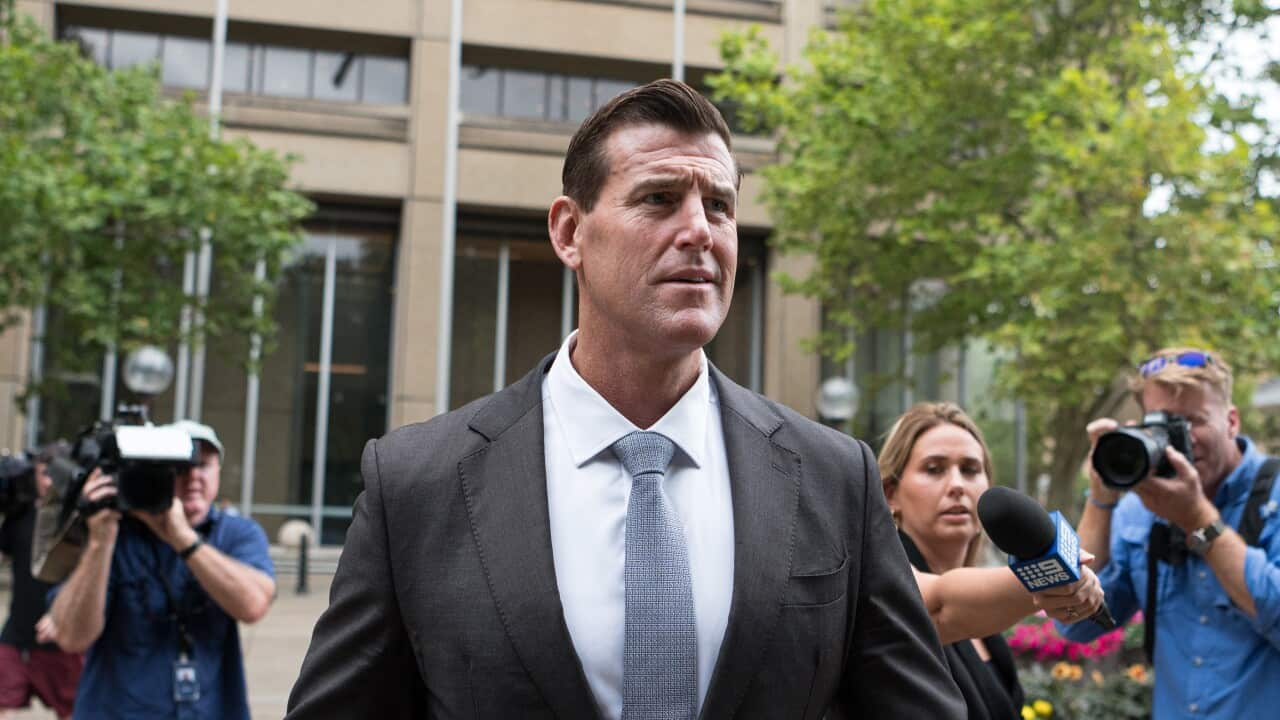Key Points
- In June 2023, a court found that 2018 reports by Nine-owned papers about Ben Roberts-Smith were substantially true.
- The reporting claimed that the ex-SAS corporal ordered a junior soldier to kill an elderly unarmed prisoner.
- Roberts-Smith has always denied any wrongdoing and is currently appealing the decision in that defamation case.
Decorated ex-soldier Ben Roberts-Smith has been criticised for trying to discredit witnesses who claimed they saw the veteran involved in the executions of two unarmed prisoners in Afghanistan.
During the second week of the Victoria Cross recipient's wide-ranging bid to overturn his landmark defamation loss, an appeals court heard five witnesses called to support allegations of the unlawful killings should be believed.
In June, Justice Anthony Besanko found 2018 reports by the Nine-owned Sydney Morning Herald and The Age as well as The Canberra Times that Roberts-Smith ordered a junior soldier to kill an elderly unarmed prisoner to "blood the rookie" were substantially true.
The ex-SAS corporal was also found to have thrown another prisoner to the ground before machine-gunning him.
Roberts-Smith has always denied any wrongdoing and has not been criminally charged.
Nine's legal team defends Whiskey 108 witnesses
Representing the three newspapers on Monday, barrister Nicholas Owens SC detailed why findings that the 45-year-old committed or was complicit in war crimes should be upheld.
He said the ex-SAS corporal had attacked five witnesses called to support this version of events, despite conceding that the soldiers were mostly honest and reliable.
"They're accepted to be reliable about absolutely everything except for the one fact that sinks the case for (Roberts-Smith)," Mr Owens told the court.
The killings occurred during an Easter Sunday raid on a compound known as Whiskey 108 during 2009.
After the SAS had secured the compound, which had been earlier attacked by an air strike, a tunnel was discovered within the premises.
Nine and The Canberra Times reported that two insurgents were discovered in the tunnel and later executed.
One of these insurgents had a prosthetic leg, which Roberts-Smith is alleged to have taken back to Australia for use as a novelty beer-drinking vessel.
Owens said the war veteran's appeal hit numerous problems.
Roberts-Smith had claimed the two men were killed legitimately as they were armed "squirters" fleeing the scene of the battle.
However, there had been no evidence of any fighting with insurgents inside the Whiskey 108 compound while it was being cleared, the court heard.
Photographic evidence also showed the elderly man's body lying near the tunnel inside the same compound, Owens said.
"He's been killed by a single shot to the head and you can see what's around his head to show that he hasn't been moved," the barrister said.
Only one 'utterly fatal' fact still in dispute, court hears
While contesting this at first, Roberts-Smith eventually conceded eyewitnesses gave reliable evidence on where the body was found and how the man had been shot.
The only contest still in place on appeal was one "utterly fatal" to the war veteran's claims the men were legitimately killed rather than unlawfully executed, the court heard.
The fact witnesses could not remember precisely how many people were found in the tunnel did not mean reports the executions took place should be rejected, Owens said.
Roberts-Smith's focus on specific and allegedly erroneous sections of Justice Besanko's 2600-paragraph judgment did not mean the entire decision should be overturned, the barrister argued.
The judge had engaged in a "sophisticated and remarkable process of reason" which although difficult to read was sequential and reached proper conclusions, Owens said.
The judgment found that Roberts-Smith kicked a handcuffed prisoner off a cliff near the village of Darwan before ordering his execution in 2012.
It also found he had ordered the killing of another prisoner that same year after a weapons cache was discovered in the village of Chinartu.
The hearing continues.



